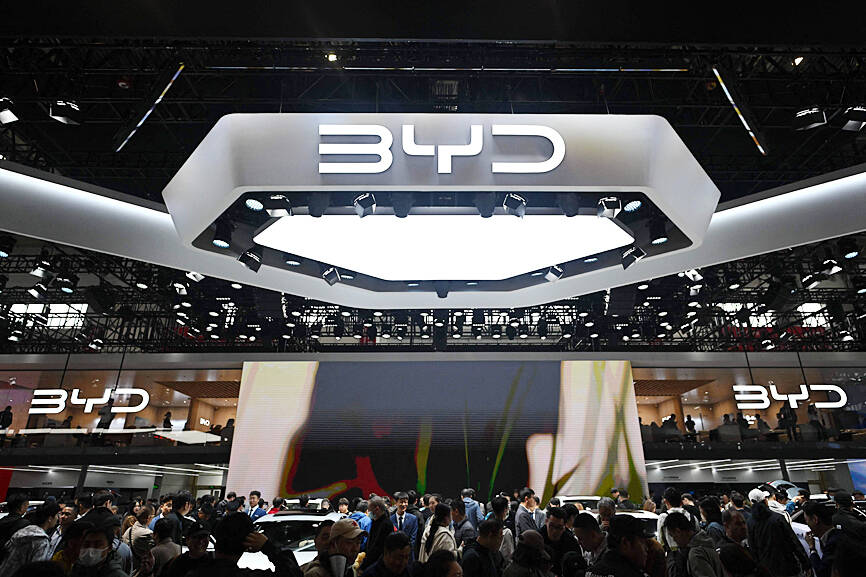Major Chinese electric carmaker BYD Co (比亞迪) yesterday reported lower-than-expected revenue for the first quarter of the year, as an aggressive domestic price war and Western regulatory pressure weighed on the company’s growth.
BYD posted an operating revenue of 124.94 billion yuan (US$17.25 billion) for the first three months of the year, up 3.97 percent from a year ago, according to a stock exchange filing.
Bloomberg analysts had predicted a quarterly revenue of 132.53 billion yuan.

Photo: Pedro Pardo, AFP
The Shenzhen-based company is moving quickly overseas — including into Southeast Asian countries but also further afield in Latin America and Europe — as a price war continues to be waged in China, the world’s largest automotive market.
BYD overtook Elon Musk’s Tesla Inc in the fourth quarter of last year to become the world’s top seller of electric vehicles (EVs). Tesla reclaimed that title in the first quarter of this year, but BYD remains firmly on top in its home market.
The Chinese automaker recorded a record annual profit of 30 billion yuan last year.
Its profit in the first quarter was 4.57 billion yuan, up 10.62 percent from a year ago, BYD said.
BYD said its research and development and marketing expenses had shot up in the first quarter due to an "increase in advertising and exhibition expenses and depreciation and amortization", as well as higher "material consumption."
China has led the global transition to electric vehicles, with almost 1 in 3 cars on Chinese roads set to be electric by 2030, according to the International Energy Agency’s annual Global EV Outlook published last week.
There are a staggering 129 EV brands in China, but just 20 have managed to achieve a domestic market share of one percent or more, according to data compiled by Bloomberg.
Rival brands have sought in recent months to undercut each other’s prices, offering customers built-in gadgets and trendy customisation options at lower and lower pricetags.
Meanwhile, European regulators are raising the alarm on what they describe as Chinese industrial "overcapacity" created by excessive state subsidies, which could flood global markets with cheap vehicles.
The EU launched an investigation last year into the subsidies, which it said had given Chinese

Nvidia Corp CEO Jensen Huang (黃仁勳) today announced that his company has selected "Beitou Shilin" in Taipei for its new Taiwan office, called Nvidia Constellation, putting an end to months of speculation. Industry sources have said that the tech giant has been eyeing the Beitou Shilin Science Park as the site of its new overseas headquarters, and speculated that the new headquarters would be built on two plots of land designated as "T17" and "T18," which span 3.89 hectares in the park. "I think it's time for us to reveal one of the largest products we've ever built," Huang said near the

China yesterday announced anti-dumping duties as high as 74.9 percent on imports of polyoxymethylene (POM) copolymers, a type of engineering plastic, from Taiwan, the US, the EU and Japan. The Chinese Ministry of Commerce’s findings conclude a probe launched in May last year, shortly after the US sharply increased tariffs on Chinese electric vehicles, computer chips and other imports. POM copolymers can partially replace metals such as copper and zinc, and have various applications, including in auto parts, electronics and medical equipment, the Chinese ministry has said. In January, it said initial investigations had determined that dumping was taking place, and implemented preliminary

Intel Corp yesterday reinforced its determination to strengthen its partnerships with Taiwan’s ecosystem partners including original-electronic-manufacturing (OEM) companies such as Hon Hai Precision Industry Co (鴻海精密) and chipmaker United Microelectronics Corp (UMC, 聯電). “Tonight marks a new beginning. We renew our new partnership with Taiwan ecosystem,” Intel new chief executive officer Tan Lip-bu (陳立武) said at a dinner with representatives from the company’s local partners, celebrating the 40th anniversary of the US chip giant’s presence in Taiwan. Tan took the reins at Intel six weeks ago aiming to reform the chipmaker and revive its past glory. This is the first time Tan

CUSTOMERS’ BURDEN: TSMC already has operations in the US and is a foundry, so any tariff increase would mostly affect US customers, not the company, the minister said Taiwanese manufacturers are “not afraid” of US tariffs, but are concerned about being affected more heavily than regional economic competitors Japan and South Korea, Minister of Economic Affairs J.W. Kuo (郭智輝) said. “Taiwan has many advantages that other countries do not have, the most notable of which is its semiconductor ecosystem,” Kuo said. The US “must rely on Taiwan” to boost its microchip manufacturing capacities, Kuo said in an interview ahead of his one-year anniversary in office tomorrow. Taiwan has submitted a position paper under Section 232 of the US Trade Expansion Act to explain the “complementary relationship” between Taiwan and the US